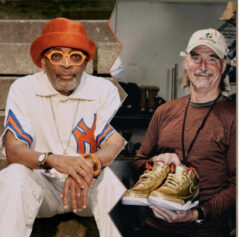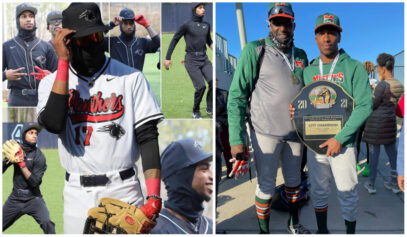It was a freezing cold December day in St. Louis in 1974 for the Howard University Bison vs. the St. Louis University Billikens NCAA soccer match at Busch Stadium.
It was so frigid, according to Bison coach Lincoln Tiger Phillips, who wrote a book about the experience, that the players toenails blackened and fell off three days later. Snow was piled everywhere. It took a half an hour to clear the snow off the field with tractors that moved it into mounds around the field before the game could begin.
The Billikens, an all-white team, were the decided favorite, but this day, Howard University hoped, would be their day of redemption.
As they played they were called the N-word. Fans held signs that read monkeys go home. The game would go into quadruple overtime.
It is this game in 1974, and another between the two teams in the 1971 NCAA tournament where Howard beat St. Louis and became the first black college to win the NCAA championship that is the focus of the film, Redemption Song, directed by Kenan K. Holley and produced by Mark W. Wright.
The film is part of a new set of shorts directed by Spike Lee called Spike Lee Lil Joints that will air on ESPNs SportsCenter on June 7.
Redemption Song Trailer – ESPN Films from Corey Frost on Vimeo.
Howard, under racially-charged circumstances, was promptly stripped of the title not long after they won it. They werent just stripped of their national championship, they were banned from post-season competition for a season on obscure procedural grounds around eligibility violations related to players participating in amateur competitions in their native countries.
The opposing team refused to accept their trophy the NCAA took from Howard.
Even though other players from other schools did this, Howard was made the example of, said Wright. A lot of these players came from outside of America, so they also alleged that some Howard players had not taken approved exams like the SAT, but rather an English equivalent to the SAT.
The average GPA for the team was 3.5.
These guys are all successful now, said Holley. I played football and I wouldnt describe our team as intellectual. But when I met these guys, they were so intellectually powerful. I felt so empowered.
Coach Phillips was earning his undergraduate degree at the same time as the players.
It was really humbling, Phillips laughs. Their coach was holding on by his fingernails with a 2.1 average and they had averages like 3.7, 3.9. The players respected me. I would make sure they got good grades and they would make sure I did.
Lincoln would receive a bachelor of science from Howard.
Today, there is an NCAA Eligibility Center that reviews each and every prospective players record and academic status.
The style of play that the St. Louis team played was called a Barcelona style, which included close passing and a possessive style much like what is seen on television today.

But the Bison played a more aggressive, fast-paced, showmanship style: the equivalent of Allen Iversons crossover on the soccer field.
Thats part of the reason I believe the NCAA had an issue, said Wright. Not only are you beating these mostly all white teams, but you guys are making us look stupid. Youre embarrassing us.
New York native Walter Blount was finishing his third year at Howard in 1971 and remembers that the entire school would make it to the games, although soccer wasnt as popular as football or basketball, he was drawn to their dominance, flair and showmanship.
I started watching it because they were so good. They were doing amazing thingsdribbling between your legs, behind your back, remembers Blount.
The premiere for the film took place at Howard Universitys crowded Cramton Auditorium last night and included commentary from legendary coach Lincoln Phillips who played against Pele, and players from 1971 and 1974 teams, along with the producer, Wright, and director, Holley.
It was about black excellence. This project put me in a place to say black people are pretty incredible, we dont take no for an answer, said Holley.
They came into Howard and they walked out whole. They came out unscathed, Phillips said about how he encouraged the team to focus on winning as redemption.
In 1974, the Bison gained redemption for being unfairly stripped of their national title years earlier, winning against St. Louis in quadruple overtime.
They went undefeated that season, 19-0, with 63 goals scored and only six goals allowed. That feat has been unequaled to this day.
For the second time, wed become the first African-American college to win an NCAA championship, Phillips wrote in his book, Rising Above and Beyond the Crossbar, Truth, I tell you. Truth. Nothing but the truth.



